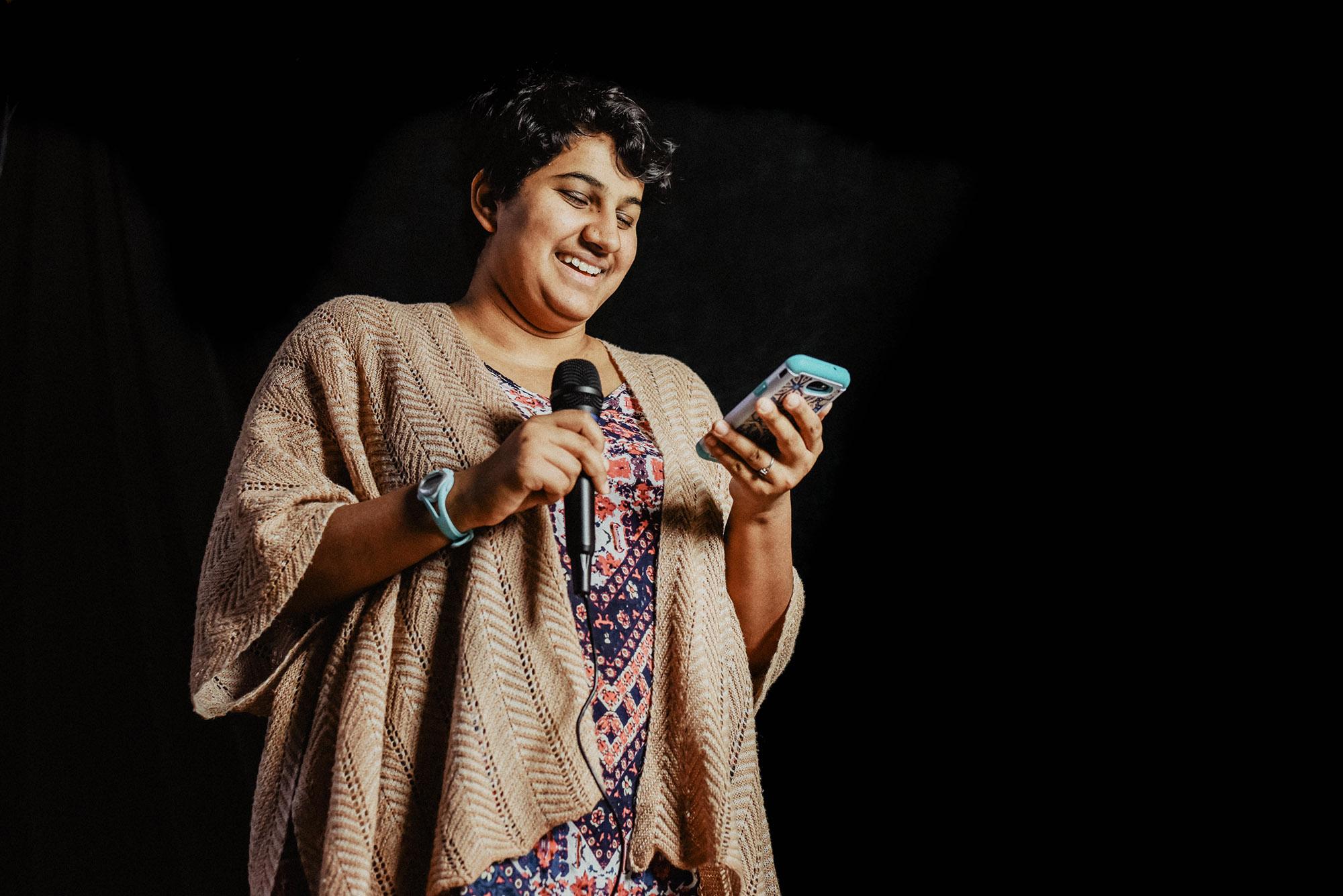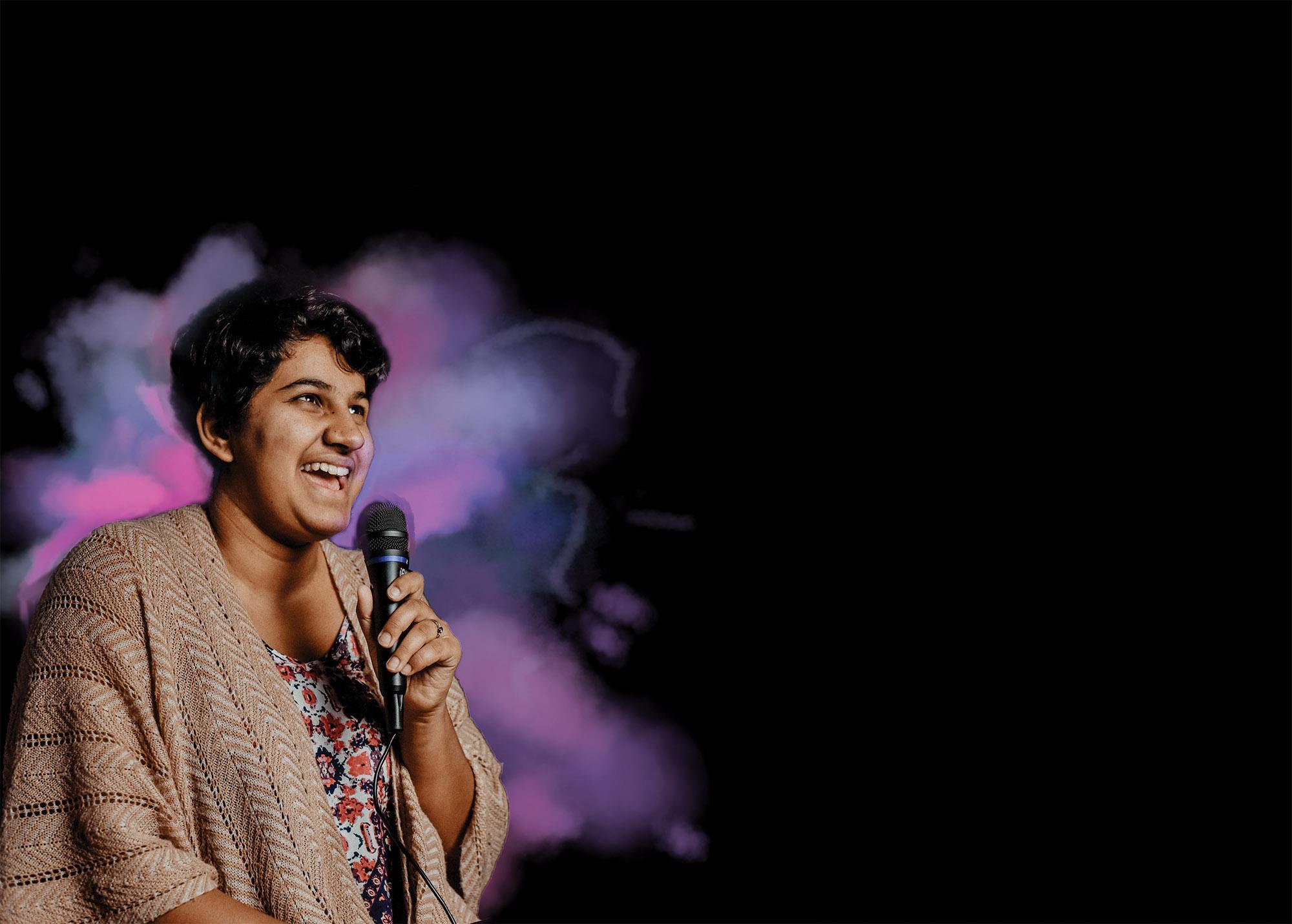I am a survivor because I’m here.
I am survivor, because despite my tear stained face,
I still smile.
I smile so bright that those who call me invisible can’t see my blinding light.
I am a survivor because I have cried,
and because I have cried I have encouraged others to peel open their wounds.
To not let them get infected by stigma.
I am a survivor because despite everything,
I lived.
I am alive.
Within the span of 10 minutes, senior Jharna Sutaria can spin a lifetime of memories into a 76-word allegory, opening a window into a past she’s only just learning to accept. Departing from the polished perfection of classical poetry, Sutaria’s work offers intimate glimpses into the raw, authentic details of her reality.
As poignant as her written poetry is, performing on stage is where Sutaria really comes to life. Even in the underwhelming quarters of the Media Arts Center portrait studio, where she launches into an impromptu performance, the gravity of her words vie for room with Manfrotto tripods and musty manuscripts, crowding the already-cluttered space. Just moments after a giggly photoshoot, Sutaria’s demeanor shifts as she begins to read; shoulders straight and voice unwavering, she carries herself with a somber gravitas.
“When I’m on stage, it’s a totally out-of-this-world feeling,” Sutaria says animatedly, breaking into a grin. “[It’s like] there’s a spotlight on me as I’m explaining my emotions and … visualizing the images of my poetry. It’s so cool.”
“When I’m on stage, it’s a totally out-of-this-world feeling … I feel like I’m the only person on this planet.”
— Jharna Sutaria, senior
Though we sit in the portrait studio, Sutaria seems to be lost in a different realm, privy to a world unfolding within her mind alone.
“I feel like I’m the only person on this planet.”
Unspoken
Growing up in Dallas, Texas, Sutaria spent much of her childhood alone. Playground politics in elementary school evolved into bullying by her peers, who alternated between barrages of verbal harassment and bouts of social exclusion.
“‘You’re not enough,’ That’s the main message I was always getting so that’s why I kind of feel that way right now,” Sutaria says.
Some weeks, she couldn’t muster the energy to get out of bed, riding a wave of lethargy that left her in an apathetic daze, detached from reality. Other weeks, she felt all too affected by the present and would turn to unhealthy coping mechanisms as a way to make herself feel smaller, to take up less space in a world that seemed not to want her.
“Whether it was eating or swimming or school [or] friendships, I was like … I’m not good enough,” Sutaria says. “That thought cycle was practiced over and over and over again, so it got more and more ingrained.”
When her dad’s job transplanted the family from Dallas to Palo Alto the during her junior year, Sutaria struggled to acclimate to her new surroundings.
“Things were definitely rough,” Sutaria says. “I felt like an outsider because I didn’t know anyone and I felt really alone so it was very, very difficult.”
Outspoken
Before high school, Sutaria kept her poems to herself, safeguarding her secret cache of creations. It wasn’t until she took a combined English and Human Geography course that she was introduced to slam poetry for the first time. She was captivated.
What began as a classroom assignment evolved into a form of catharsis, a way for Sutaria to process her past and articulate the unspeakable. Back in Dallas, she’d perform regularly at local coffee shops, her weekends spent scribbling furiously and speaking fervently.
“Something about talking on stage and the alternative style of poetry made it a coping mechanism for me,” Sutaria says. “I could just put all my thoughts on paper. There was no right or wrong … and that really resonated with me.”
“Something about talking on stage and the alternative style of poetry made it a coping mechanism for me … There was no right or wrong and that really resonated with me.”
— senior Jharna Sutaria
For Sutaria, performing transforms the language of poetry. Reading her compositions aloud imbues her pieces with a gravity that transcends the power of printed words.
“When I write it [poetry] on paper, it’s just mine to see,” Sutaria says. “Because I can see my emotions on paper, I don’t feel as alone. When I read it out loud, it’s different because now it’s like everyone can see it and everyone can learn from it, almost like an emotional textbook.”
Beyond offering relief, performing poetry also grants Sutaria a sense of purpose, helping her share her story with others to help them feel less alone.
“When I see that it [poetry] helps other people, I feel like I have this purpose in life, like I’m not just another person, and that really helps me,” Sutaria says. “For me, it reinforces the idea that I have a purpose here, and I’m making a difference, and I deserve to be here.”
Spokeswoman
Though some mornings Sutaria still finds it hard to pull herself out of bed, she’s taking each day as it comes.
“I’ve come a long way,” Sutaria says. “I [still] have ups and downs, but I’m doing much, much better than I was before.”
Now a senior, Sutaria plans to continue writing when she attends Foothill College in the fall. She eventually hopes to become a sports journalist to educate the athletic world about mental health.

Between performing at local jams, swimming for the Paly team and volunteering as a member of the Teen Arts Council, Sutaria keeps herself occupied and gratified. While poetry is no panacea, it’s helped Sutaria come to terms with her past and comfort others who’ve experienced similar ordeals.
“I’ve struggled with some bullying and some [trauma] and it’s been rough for sure, but I think that’s all made me stronger as a person,” Sutaria says. “If you can power through something like that — not only power through [but] help others power through — I think that’s a huge deal.”
Through relaying her personal stories to others with similar backgrounds, she aspires to inspire: to help others struggling with mental health know that they are not alone and encourage them to speak out themselves.
“You don’t go to hell and back and just keep that to yourself,” Sutaria says. “I honestly think that’s the reason I’ve been put on this earth: to help other people who are going through the struggles I’m going through.”
Any person who is feeling depressed, troubled or suicidal is urged to call 888-247-7717 or 855-278-4204 or text “START” to 741741 to speak with a trained crisis counselor live.

